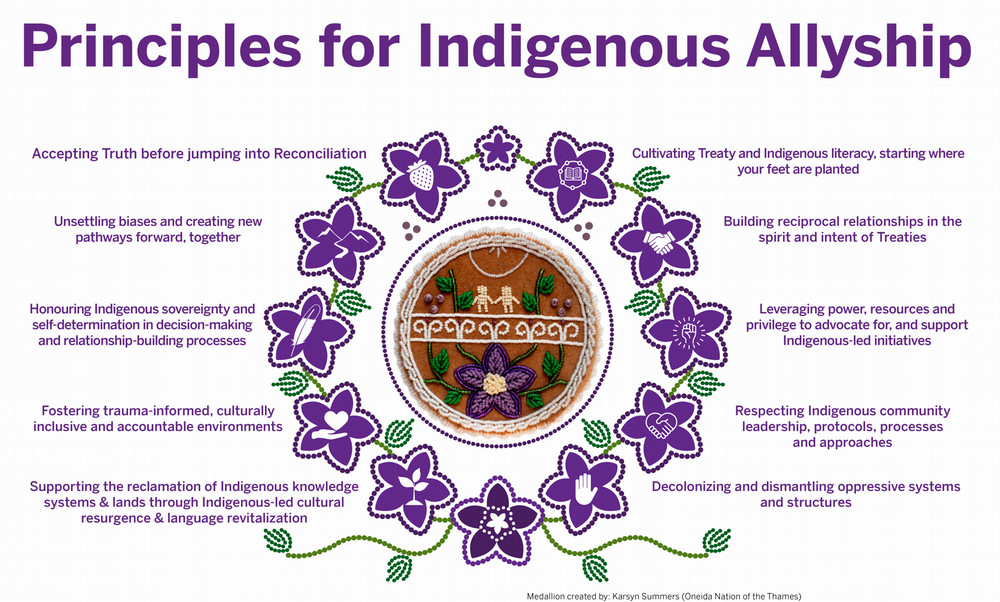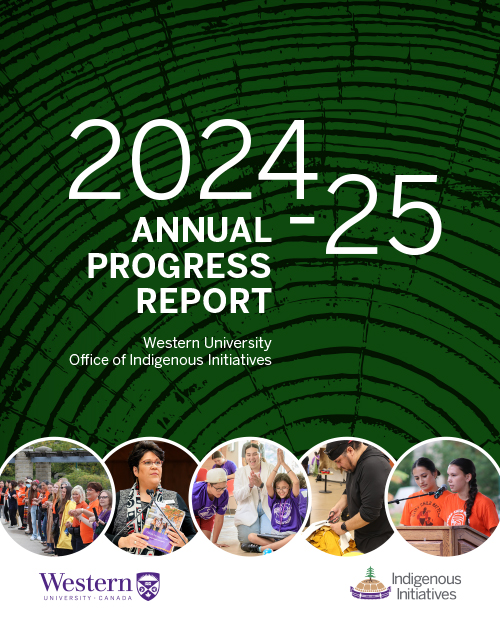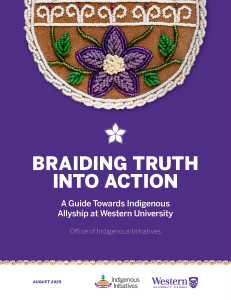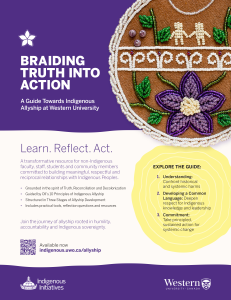Indigenous Allyship at Western
Braiding Truth Into Action: A Guide Towards Indigenous Allyship at Western University is a transformative resource for non-Indigenous faculty, staff, students and community members committed to building meaningful, respectful and reciprocal relationships with Indigenous Peoples.
This guide builds upon the Principles of Indigenous Allyship released in 2024 and deepens our collective understanding of allyship through practical tools, teachings and reflections. It supports the Western community in engaging with the ongoing work of Truth and Reconciliation by fostering informed, sustained and relational approaches to collaboration with Indigenous communities.
We invite you to explore the guide as part of your journey towards Indigenous allyship.
Why do we need allies?
Allies play a crucial role in supporting Indigenous peoples and advancing reconciliation efforts. At Western University, located on Anishinaabe, Haudenosaunee and Lunaape land and connected to Treaties made with the Deshkan Ziibiing Anishinaabek (Chippewas of the Thames First Nation), we recognize the importance of collective action in addressing historical injustices and building a more equitable future.
Reconciliation must involve everyone. Some key reasons include:
- Collective Responsibility: The negative impacts of colonization and systemic discrimination affect all of society. Everyone has a role in acknowledging these harms and working towards healing and justice.
- Education and Awareness: Learning about the historical and contemporary experiences of Indigenous Peoples fosters empathy and supports meaningful change.
- Policy and Systemic Change: Post-secondary institutions are able to influence positive developments that advance equity and reconciliation.
- Building Relationships: Reconciliation requires respectful and reciprocal relationships between Indigenous and non-Indigenous people, built on mutual effort and understanding.
- Shared Future: Creating a better future for everyone means working together to address past wrongs and build a society based on mutual respect and equity.
In support of non-Indigenous colleagues activating Western’s Indigenous Strategic Plan (2016) and its institutional strategic plan, Towards Western at 150 (2022) - specifically Theme 2: People, Community and Culture - we engaged Indigenous faculty, staff, students and community members on what Indigenous allyship at Western looks like.
Their insights strongly aligned with the Truth and Reconciliation Commission's (TRC) 2015 report Volume 6, Principles for Reconciliation (p. 16). This Guide offers principles and practices to help the Western community grow its capacity for reconciliation initiatives and deepen collaboration with Indigenous faculty, staff, students and local Indigenous communities and organizations.
Principles of Indigenous Allyship
The following ten principles were developed in collaboration with Indigenous faculty, staff, students, and community members at Western University. They reflect the values, responsibilities, and commitments necessary for meaningful Indigenous allyship and are grounded in the Truth and Reconciliation Commission’s Principles for Reconciliation.
These principles are not a checklist, but a foundation for ongoing learning, unlearning, and relationship-building:
- Accepting Truth before jumping into Reconciliation
- Cultivating Treaty and Indigenous literacy
- Committing to unsettling and creating new pathways forward together
- Closing gaps, removing barriers, decolonizing and dismantling oppressive systemic structures
- Supporting the reclamation of Indigenous knowledge systems and lands through Indigenous-led cultural resurgence and language revitalization
- Nurturing culturally inclusive and trauma-informed learning environments
- Building reciprocal relationships in the spirit and intent of Treaties
- Using power, resources and privilege to advocate for and support Indigenous-led initiatives
- Respecting Indigenous community leadership, protocols, processes and approaches
- Honouring Indigenous sovereignty and self-determination in decision-making and relationship-building processes
When might you use this Guide?
The principles of Indigenous allyship can guide you in a wide range of situations to support respectful, informed, and effective engagement with Indigenous Peoples and communities. You might turn to this guide when:
- You are curious about supporting Indigenous initiatives.
- Before or while engaging with Indigenous colleagues.
- Before or while bringing Indigenous content into your curriculum or programming.
- When collaboration is stalling or challenging.
- When you feel stuck or are not sure what you can do.
- When you feel like you might have made a mistake.
- When you want to work on a project that engages Indigenous colleagues.
- You want to build your personal or team’s capacity for building relationships and collaborating with Indigenous colleagues.
- You feel like you don’t know where to start.
- You’re not sure if your project or initiative is culturally appropriate or respectful.
This guide is designed to support reflection, learning and action at any stage of your allyship journey.
What does Indigenous allyship look like?
These principles aim to provide a foundation for non-Indigenous staff and faculty to support Truth and Reconciliation efforts at Western. They foster a deeper understanding and collaboration with Indigenous people and communities.
Here's how these principles can be reflected in practice:
- 1. Accepting Truth Before Reconciliation:
- Emphasizes understanding the historical and ongoing impacts of colonization.
- Encourages critical self-reflection to understand these impacts without relying on Indigenous colleagues to explain them.
- 2. Cultivating Treaty and Indigenous Literacy:
- Stresses the importance of learning about local Indigenous histories, languages, governance, and Treaties.
- Encourages understanding the systemic efforts to displace Indigenous Nations and the importance of Treaties.
- 3. Committing to Unsettling and Creating New Pathways:
- Focuses on unlearning biases and norms, and working with Indigenous people to disrupt and rebuild towards justice and Reconciliation.
- Highlights the importance of systemic change and addressing structural barriers.
- 4. Building Reciprocal Relationships:
- Advocates for building relationships based on mutual benefits and equity.
- Emphasizes the importance of respecting Indigenous protocols and processes.
- 5. Leveraging Power, Resources, and Privilege:
- Encourages using one's position to advocate for and support Indigenous-led initiatives.
- Stresses the importance of amplifying Indigenous voices and ensuring accountability in long-term relationships.
- 6. Closing Gaps and Removing Barriers:
- Focuses on dismantling oppressive systems and structures within institutions.
- Encourages familiarity with reports and recommendations that identify these barriers.
- 7. Respecting Indigenous Leadership and Protocols:
- Highlights the importance of engaging Indigenous people meaningfully in projects and initiatives.
- Stresses the need for understanding and accommodating Indigenous protocols and timelines.
- 8. Supporting Indigenous Knowledge Systems and Cultural Resurgence:
- Encourages supporting the reclamation of Indigenous knowledge systems and languages.
- Emphasizes the importance of engaging Elders and Knowledge Keepers in knowledge-sharing.
- 9. Fostering Trauma-Informed and Culturally Inclusive Environments:
- Advocates for creating safe and inclusive learning environments that respect Indigenous ways of knowing.
- Highlights the importance of being aware of and addressing cultural insensitivity and trauma.
- 10. Honouring Indigenous Sovereignty and Self-Determination:
- Emphasizes the importance of recognizing and respecting Indigenous sovereignty and self-determination.
- Encourages integrating the United Nations Declaration on the Rights of Indigenous Peoples (UNDRIP) into Reconciliation efforts.
What does Indigenous allyship look like in research?
Western Research’s complimentary guide Centering Indigenous Voices: A Guide Towards Allyship in Indigenous Research offers practical and principled direction for engaging in respectful, ethical Indigenous research. It supports researchers, staff, students, and trainees in building trust, fostering accountability, and respecting Indigenous sovereignty, knowledge systems, and culturally appropriate protocols.
Indigenous research includes any work that may impact Indigenous Peoples, their data, Lands (water, air, plants, animals), and/or knowledges. This guide helps answer the question: “Where do I begin?” and encourages approaches that contribute meaningfully to Indigenous well-being and self-determination. Developed in partnership with the Office of Indigenous Initiatives and through collaboration with Indigenous and non-Indigenous contributors, this resource strengthens Western’s commitment to reconciliation and Indigenous data sovereignty.
Supporting Resources
First Nations in Southwestern Ontario
Reports, Declarations, Calls to Action, Calls for Justice
More resources releasing soon.




